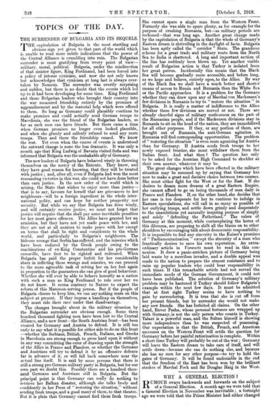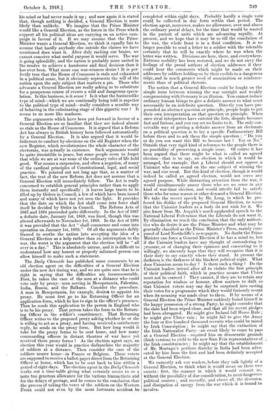WHY A GENERAL ELECTION? R UMOUR sways backwards and forwards on
the subject of a General Election. A month ago we were told that a General Election in November was inevitable ; a fortnight ago we were told that the Prime Minister had either changed his mind or had never made it up ; and now again it is stated that, though nothing is decided, a General Election is more likely than unlikely. We imagine that the Prime Minister would like a General Election, as the forces in the Press which support all his political ideas are carrying on an active cam- paign in favour of it. If we may assume that the Prime Minister wants a General Election, we think it equally fair to assume that hardly anybody else outside the classes we have mentioned does want it. After duly racking our brains, we cannot conceive what useful purpose it would serve. The war is going splendidly, and the nation is probably more united in the resolve to achieve a handsome and final decision than it has ever been. What more can war-winners desire ? It is per- fectly true that the House of Commons is stale and exhausted in a political sense, but it obviously represents the will of the nation upon the only subject that matters a pin. Those who advocate a General Election are really asking us to substitute for a prosperous course of events a wild and dangerous specu- lation. Is this business, is it sense ? Is it what the businesslike type of mind—which we are continually being told is superior to the political type of mind—really considers a sensible way of behaving in the culminating stage of this gigantic war ? It seems to us more like madness.
The arguments which have been put forward in favour of a General Election are so familiar that they are indeed almost as stale as the House of Commons. It is argued that a Reform Act has always in British history been followed automatically by a General Election. It is also argued that it would be ludicrous to conduct by-elections on the old Register when the new Register, which revolutionizes the whole character of the electorate, was actually in existence. Such arguments would be quite irresistible in peace, but some people seem to forget that while we are at war none of the ordinary rules of life hold good. War means a suspension, and often a negation, of many of the cardinal principles of Constitutional, legal, and social practice. We pointed out not long ago that, as a matter of fact, the text of the new Reform Act does not assume that a General Election will immediately follow. The Act is really concerned to establish general principles rather than to apply them instantly and specifically ; it leaves large tracts to be filled up by Orders in Council, a few of which have been issued and many of which have not yet seen the light. It provides that the date on which the Act shall come into force shall itself be decided by Order in Council. The Reform Acts of 1867.and 1884 proceeded quite differently. In the Act of 1867 a definite date, January 1st, 1869, was fixed, though this was altered afterwards to November 1st, 1868. In the Act of 1884 it was provided that the Act "shall commence and come into operation on January 1st, 1885." Of all the arguments deftly framed to soothe the nation into accepting the idea of a General Election as a help rather than an interruption to the war, the worst is the argument that the election will be "all over in a day." This is absolutely untrue, and it is difficult to understand how any honest or properly informed person can allow himself to make such a statement.
The Daily Chronicle has published some comments by an old election agent on the difficulties of a General Election under the new Act during war, and we are quite sure that he is right in saying that the difficulties are insurmountable. First, he takes the case of the men at a distance who could vote only by proxy—men serving in Mesopotamia, Palestine, India, Russia, and the Balkans. Consider the procedure. A man in Mesopotamia, for example, desires to appoint his proxy. He must first go to his Returning Officer for an application-form, which he has to sign in the officer's presence. Then he sends this application to the person in England who is to be his proxy. That person takes the form to the Return- ing Officer in the soldier's constituency. That Returning Officer writes to the proposed proxy asking whether he or she is willing to act as a proxy, and having received a satisfactory reply, he sends on the proxy form. But how long would it take for the proxy forms to be sent home, and how many commanding officers in distant theatres of war have yet received these proxy forms ? As the election agent says, an election this year would in practice disfranchise the majority of soldiers at a distance. Then consider the case of the soldiers nearer home—in France or Belgium. These voters are supposed to receive a ballot-paper direct from the Returning Officer at home, which has to be sent back to him within a period of eight days. The election agent in the Daily Chronicle works out a time-table giving what certainly seems to us a none too generous allowance for the 'various transactions and for the delays of postage, and he comes to the conclusion that the process of taking the votes of the soldiers on the Western Front could not even by the most fortunate accident be completed within eight days. Probably hardly a single vote could be collected in duo form within that period. The election agent, moreover, makes no allowance, over and above the ordinary postal delays, for the time that would be wasted in the pursuit of units which are advancing rapidly. At present, and we hope that it may be so till the conclusion of the war, the whole front is in a fluid condition. It is no longer possible to send a letter to a soldier with the tolerable certainty that he will be exactly where he was when the letter was written. Divisions are here, there, and everywhere. Extreme mobility has been restored, and we do not envy the feelings of the proud authors of election addresses if they could hear the comments which might be made on their addresses by soldiers holding on by their eyelids to a dangerous ridge, and in much greater need of ammunition or reinforce- ments than of political rhetoric.
The notion that a General Election could be fought on the simple issue between winning the war outright and weakly compromising with Germany is an illusion. You cannot induce ordinary human beings to give a definite answer to what must necessarily be an indefinite question. Directly you have pro- pounded an abstract question or principle, people begin to put their own interpretation on that question or principle. When once rival interpreters have entered the lists, dispute becomes fast and furious, and you can set no limits to it. The only con- ceivable way of getting a definite answer from an electorate on a political question is to lay a specific Parliamentary Bill before them and to ask them the simple question : "Do you or do you not want this Bill to become law ? Yes or No." Outside that very rigid kind of reference to the people there is no possibility of preserving a simple issue. Of course it has been argued that there might be what is called an agreed election—that is to say, an election in which it would be arranged, for example, that a, Liberal should not oppose a Unionist who was sound on the one subject of winning the war, and vice versd. But this kind of election, though it would indeed be called an agreed election, would not serve any agreed purpose. While distracting attention from the war, it would simultaneously annoy those who see no sense in any kind of war-time election, and would utterly fail to satisfy those who for some reason or other demand a General Election. We take the recent speech by Mr. Long, in which he pro- fessed his dislike of the proposed General Election, to mean that the Unionist leaders as a body do not wish for it. We also know from Mr. Asquith's much-applauded speech to the National Liberal Federation that the Liberals do not want it. By elimination we reach the conclusion that the only authori- ties who do desire it are the Prime Minister and what may be generally classified as the Prime Minister's Press, mainly com- posed of Lord Northcliffe's newspapers. No doubt the Prime Minister can force a General Election if he has a mind to, but if the Unionist leaders have any thought of surrendering to pressure, or of changing their opinions and consenting to it willingly, we sincerely hope that they will recognize that it is their duty to say exactly where they stand. At present the darkness is the darkness of the blackest political night. What does Unionism mean to-day ? Is there such a thing ? Do the Unionist leaders intend after all to violate the first principle of their political faith, which in practice means that Ulster must not be coerced ? They cannot, if they are to retain any reputation for wisdom or honour, allow matters to drift so that Unionist voters may one day be surprised into casting their votes for a programme which they would furiously resent when its meaning was made clear to them. If by means of a General Election the Prime Minister suddenly found himself in the happy possession of a strong Party, he might consider that the slate had been wiped clean, and that all his recent pledges had been abrogated. He might give Ireland full Home Rule ; he might give Ulster ruin ; he might fail to give the Army the four or five hundred thousand recruits who could be raised by Irish Conscription ; he might say that the extinction of the Irish Nationalist Party—an event likely to come to pass at a General Election—required him on democratio grounds (Irish version) to yield to the new Sinn Fein representatives of , the Irish constituencies ; he might say that the establishment of Mr. Montagu's perilous diarchy in India had been advo- cated by him from the first and had been definitely accepted at the General Election.
We earnestly ask our readers, before they talk lightly of a General Election, to think what it would mean on these two counts : first, the manner in which it would commit us, without the possibility of due consideration, to most dangerous political courses ; and secondly, and above all, i the diversion and dissipation of energy from the war which it s bound to involve.



































 Previous page
Previous page